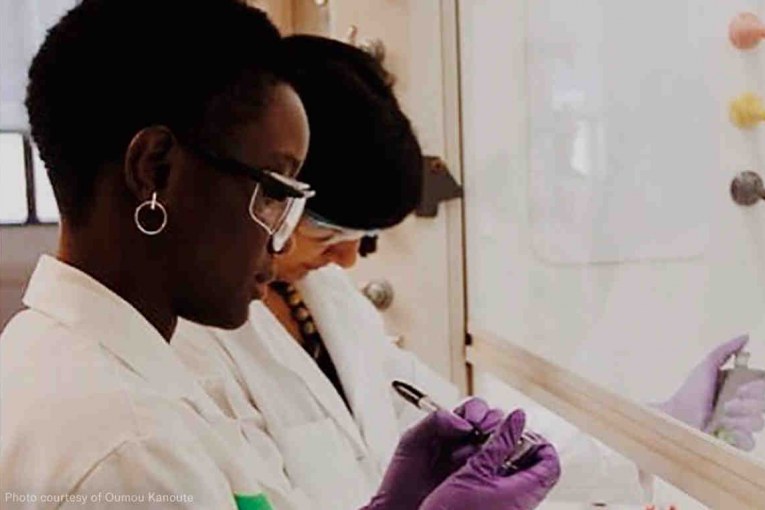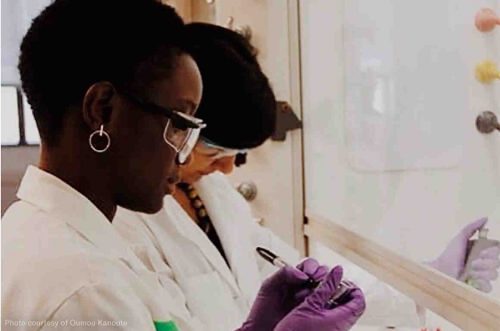
 By Oumou Kanoute
By Oumou Kanoute
Enrolling in Smith College a year ago was a dream come true. But rarely has a dream so swiftly turned into a nightmare. As I begin my sophomore year, I’m returning to a new slate of classes and to unsettling memories that I wish I could shake.
This summer, I was racially profiled — an all-too-common experience for Black people in America. But unlike most people who are targeted for simply existing in their skin, my story of harassment went viral.
It happened on July 31, when I was working on campus for a program that encourages high school girls to pursue careers in science, technology, engineering, and math (STEM). I was proud to remain on school grounds instead of taking a full summer vacation like many of my peers. As the first person in my family to attend college, every moment at a prestigious institution like Smith was a reminder that my mother’s hard work had paid off.
The day didn’t seem different than any other. I headed into the building’s common room to set my belongings down and then went into the cafeteria to grab lunch. Eating on campus might seem like a typical student activity. But as a Black student, I received a familiar look of suspicion from a college employee who questioned my presence in the dining hall line as I began to fix myself a  plate.
plate.
I was greeted by a woman: “You’re not supposed to eat here,” she said.
I informed her of the mentorship program I work for and offered to get my card to prove it. She then allowed me to go on my way.
But the employee apparently wasn’t satisfied. As I was sitting in common room, I noticed a man pacing by the glass doors. Soon he was joined by the same woman who had approached me as I was fixing my plate. The two of them, both white, whispered to each other as I sat on the other side of the glass, wondering what was happening.
A few moments later, I looked up to see the same man who’d been pacing outside the door now approaching me, this time with a police officer. My anxiety was overwhelming. I had gone from a 20-year-old eating a meal on her own campus to the subject of a police interrogation. In my fear, I prayed and tried to remain calm — and pressed record on my cell phone.
“We’re wondering why you’re here,” said the police officer. He was on the scene, he said, because I had been described as “out of place” and demonstrating “suspicious behavior.”
A few humiliating minutes later, the questioning was over. But the pain certainly wasn’t. As I write this, I still feel overwhelmed with anxiety and sadness over what happened. I still struggle to leave my room. Walking into the dining hall to grab a meal fills me with dread.
I am one of many Americans who has been targeted by racially biased calls to the police, treated like a potential criminal for the act of “living while Black.” This everyday form of racial profiling isn’t only happening to people sitting peacefully at a Starbucks or checking out of an Airbnb. From Yale, to Colorado State University, to Smith, racism is also prevalent on the very college campuses that claim to be safe spaces. These incidents are being captured on cellphones, thanks to a younger generation that is tech-savvy — but also scared.
It wasn’t too long ago that students like me couldn’t even sleep in the dorms on a college campus like Smith. I find myself thinking about Otelia Cromwell, who in 1900 became Smith’s first Black graduate. Otelia wasn’t allowed to live on campus. Her legacy, along with incidents like mine, reminds us of the significant work still required to address the systems that tell us that we don’t belong.
Attending Smith College has helped me realize my dreams and purpose in life. It has also shown me that unity and visibility are important. First-generation students and students of color should know that they belong and deserve to thrive in a society that often tells them otherwise. I am deeply hurt by what happened, but also determined to make it doesn’t happen to anyone else.
To that end, I am using this platform to make demands of the college that I love. Among them is a call for Smith College to adopt new policies and training that address race and gender — including policies that improve how law enforcement officers navigate incidents like mine.
I also demand that Smith take more steps to address the history of Black students and the school’s legacy of institutional racism. I want a more fitting commemoration of Otelia Cromwell. I want an examination of the racism that shows up in the naming of campus buildings. I want concrete action taken to provide affinity housing for students of color.
Most of all, I want a campus where hard-working students are never told that they are “out of place.”
Oumou Kanoute is a sophomore student at Smith College
Get Tickets To Vanguard’s Immigration Rights Event
https://www.gazettenet.com/ACLU-to-represent-Smith-College-student-in-police-incident-20007040
Something to consider here, the person who reported Miss Konoute called it in as a male acting suspiciously in an empty room of the cafeteria. Miss Konoute has very short hair so it’s not that odd that someone might’ve mistaken her for a man. Smith College is an all female institution.
As usual, there’s more to this story.
Or, not… my concern is not identifying some bigoted idiots as A-holes, but the implication that all whites (or only whites) are bigoted idiots…
Yet your posit,
does raise the possibility (however remote) of attitudes towards those who may appear to be so-called “she-males”, etc. Does open the door to other bigotry possibilities… still wrong… also raises the issue (see my cite, earlier) whether PAID admin leave was appropriate…
It is not uncommon for African and African-American females to have very short hair. The fact that she was mistaken for a male reflects a lack of cultural sensitivity and awareness, which is the point the author was making.
But if her being mistaken for a male in an all female institution was the reason she looked out of place then it might have nothing to do with race.
Haven’t you ever mistaken a guy with long hair might be female or a woman with very short hair might be a man regardless of their race?
If someone looks at her picture, and mistaken for male, one needs eye surgery…
Well the fact is that the person who called it in reported it as a male.
So maybe they do need eye surgery, or whatever, but the fact is what it is.
Indeed. That plus the fact that she spoke to the reporting party, who then refers to her first in the feminine and then changes the pronoun’s gender all point to the caller’s real intent, much as the spurious accusations of a “PR” team is just dissembling.
edited
John Hobbs, do we even know if that was the employee who called in the police?
It could’ve been a different employee. So far the college hasn’t named the employee who made the call.
If she was mistaken for being male, it likely would have been VERY easy to quickly identify her gender by simply going up and saying “hello” rather than calling the police. Instead, the college personnel exhibited an unusually high fear of African American male violence that reveals racial bias.
Gender misidentification aside, we are talking about mid day in the cafeteria of a university, eating lunch. What if they did think she was a male. Engaged in the very threatening activity of ….eating lunch. Requires a call to the police instead of a “Hi, what’s up? Haven’t seen you around here before.Really?
https://www.smith.edu/about-smith/diversity/campus-police-call#transcript
Thank you for the link, Jerry.
Here’s a more balanced view of what occurred:
https://www.bostonglobe.com/opinion/2018/08/06/smith-college-racist-incident-that-wasn/DqB70T11oFZ4LHm6j5z6IM/story.html
Keith O: Here is a more balanced view of Jeff Jacoby’s unbalanced op-ed that you linked to:
https://www.masspoliticsprofs.org/2018/08/08/jeff-jacobys-latest-embarrassingly-wrong-and-dangerously-irresponsible/
By reading a publications about I thing that this incident was blown out of proportion by ACLU. and I would like to read the report of the two private attorneys who investigated the incident . Both were worked with the United States Department of Education, Office for Civil Rights (OCR). One was senior civil rights attorney and team leader with OCR . I am familiar with this federal agency . Joke .
I’m sorry, we can’t have THAT
Keith O
The Globe columnist makes the same mistake that you do: One does not need to call the campus police to find out if someone sitting on a couch is a “male”. Only unfounded fear leads to the actions taken by the employee.
Here’s the alt-right’s take on the matter that came up on a Google search: https://turtleboysports.com/tag/oumou-kanoute/
Thread cleanup: 5 comments removed.